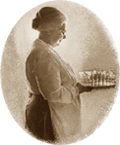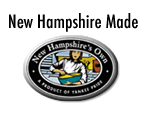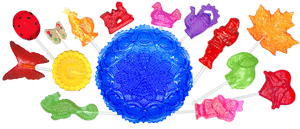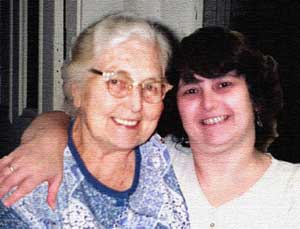In
1971 when my mother began making Barley Candy lollypops,
neither of us had any idea quite what we were getting
into.
It began as a hobby. She was curious and
set out to recreate a childhood memory. Nothing less than
the real thing would do. She asked my father for a couple
of antique lollypop molds for her birthday, then began
searching for the recipe. She cooked and cooked until
she had made exactly the candy she remembered. She made
a few and shared them.
People wanted more. Then local stores started asking
for them. I was in College while my mother’'s “
hobby” was becoming a job. In the beginning I worked
with her in our family's kitchen, between my classes,
helping when she had a particularly big order. She finally
had to hire full time help and I went off to finish my
degree and begin teaching. Around the same time, our neighbors
started to complain that there were tractor trailers delivering
supplies to our residential neighborhood…. so my
parents decided that they should move the business to
New Hampshire and into what was once my Great-Grandparent's
inn.
They converted the upstairs bedroom where my mother
had been born into their personal kitchen. Then they converted
the room which had once been the town's post office into
the candy kitchen. The old dining room became the “filing”
room (where we file and wrap the lollypops) and the old
front parlor became our office and shipping room, (where
we have to be careful not to bump our heads on the pair
of antique kerosene chandeliers which grace the ceiling.)
In 1981 I moved my young family (my husband and
two, of what would later become, four boys) to Eaton Center
and began working once again making Barley Candy with
my Mom. Years before I had been an assistant, mainly processing
candies, sticking sticks and wrapping pops. This began
a real apprenticeship. Believe it or not it takes more
than a year just to learn the basics of how to cook and
pour syrup into all the different antique molds we use.
Then it's two or three years before you become truly proficient.
It looks simple. You mix up the recipe, boil the syrup
add the colors and flavors then pour into the mold, right?
Wrong. It's very precise. Two degrees undercooked and
you have a taffy while two degrees over and the candy
is burnt. The candy thickens and hardens as it cools,
so if it's too cool as you pour, it won’t fill in
all the details of the mold, and if the mold is too cold
when you try to take the candy out, then the candy is
“frozen in” and won't release from the mold.
This says nothing about all of the special items. Everything
is done by hand, one lollypop at a time.
Each mold is unique with its own idiosyncrasies.
We are now up to 14,000* different molds in the museum's
collection. I do not expect to ever pour them all, though
at this point, I expect I could pour any one. This is
now my twenty-eighth year and our thirty-eighth year in
business. We are practicing a lost art, crafting beautiful,
unique, intricate, delicate, and detailed creations…
and they taste pretty good too.
Sincerely,
Faith Timberlake-Alves
*Yes, my
Dad is still collecting.He has been working on making
the museum available on line. If you would like to view
some of his collection, it's now on line! Click on the
museum logo below.
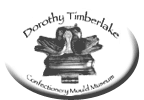

Have
you read any of these articles about us?
Boston
Globe (March 10 1972 & Dec 15 1982)
Yankee Magazine (Nov. 1978)
New Hampshire Times (Nov. 22 1982)
New Hampshire Sunday News (Dec. 28 1986)
New England Living (March 1991)
Victoria Magazine (Dec. 1992)
American Country Collectables (Winter 1993)
Washington Post (Dec. 19 1993)
Country Victorian (March 1994)
Gourmet Magazine (Dec. 1994)
Romantic Homes (Nov. 1995)
Mary Englebright's Home Companion (March 1997)
McCall's (April 1997)
Food Finds (Dec. 2001)
Martha Stewart Weddings
(Spring 2002, Summer 2003, Summer 2004,
Fall 2004, Summer 2005, Collector's Edition 7/2007)
Country Home (April 2004)
Brides (March/April 2005
The Knot (Spring 2005)

